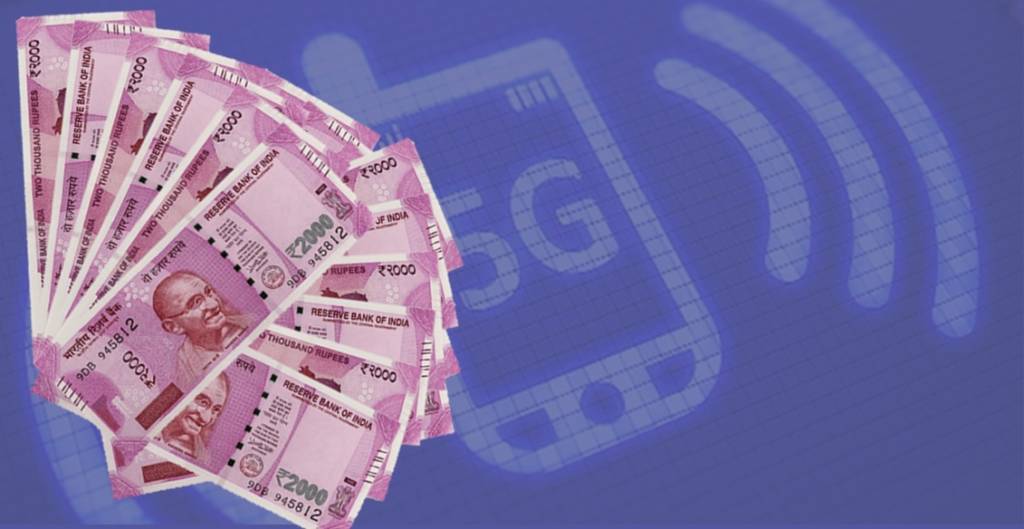The corporate tax cut given out by Nirmala Sitharaman today is a major boost for the economy, and it costs the government 1.45 trillion rupees in revenue, which nearly a per cent of the GDP. Hence, such an unprecedented tax break intended to boost growth, shall also cause major revenue shortfall to the government in the short term. However, one way the Modi government could afford this booster to the economy, is if it has been looking to bridge this revenue shortfall with the auction of the 5G spectrum.
Yesterday, in a big development it was announced that the Modi government will appoint an auctioneer in line with its plan to auction 5G waves by January. Telecom Secretary Anshu Prakash has said, “By end of this year or by January, we should have the auction (for 5G airwaves).” He also said, “We have already started the process of deciding who will conduct the auction. The request for proposal is done, inter-ministerial committees are happening, hopefully very soon we will decide who the auctioneer is and in parallel, we take all these other decisions such as what the reserve prices are. We will take a call on it.”
It must be noted that the government had successfully raised Rs. 65,789 crore through the sale of spectrum in the 2016-17 fiscal. This is only a fraction of the Rs. 5.63 trillion spectrum, at base price that it had offered for sale. The government however, did not auction any spectrum in the 2017-18 and 2018-19 fiscals. Now, the Modi government is making the big move by moving towards the auction of the premium airwaves. The advent of 5G is expected to ensure higher data speeds and propel Internet of Things, which would lead to a transformation in sectors like agriculture, manufacturing, healthcare and education.
The true significance of this move lies in the fact that the revenue earned from the auction of the 5G spectrum waves can potentially set off the costs incurred by the government following the massive corporate taxes cut announced by the Modi government yesterday. In a move that has come as a shot in the arm for India Inc, Finance Minister Nirmala Sitharaman has slashed corporate taxes to the tune of Rs. 1.45 trillion paid by domestic manufacturers. With these optimal tax rates, India has become one of the lowest tax regimes in Asia and one of the most investor friendly options.
India has announced an unprecedented cut in corporate tax rates. The effective rate of taxation (including cess and surcharges) stood at 34.94% before this move was announced. Now, it has been reduced to 25.17%. This is being widely hailed as a major reform bringing down the rate of taxation to the optimal level which will improve tax compliance in the long run augmenting tax revenues of the government. In the short term, the government might incur some loss in revenues but it is banking on a boost in investments and job growth. The government has announced another major reform by allowing new manufacturing firms to pay taxes at 15% if they set up and start manufacturing by March 31, 2023. Earlier such firms were taxed at 25%. This time bound measure is aimed at attracting companies fleeing China in the face of the ongoing tariff war between the US and China.
The corporates and markets have responded emphatically to this move. The Sensex closed 1921.15 points in green while Nifty closed at 569.40 points up. This is the biggest stock markets rally in the last 10 years. With this, India Inc seems to have got its mojo back and the Indian economy has embarked on a massive revival phase. The tax bonanza initiated by the Modi government has therefore instantly yielded desired results.
This massive tax break announced by the government is expected to boost investments and job growth in an unprecedented manner. However, in the short term the government stands to incur a major loss in its revenues. In such circumstances, the announcement of the lucrative 5G spectrum sale could not have been timed better. The union government has estimated the revenue target of direct tax to be around 13.35 lakh crore rupees but given the tax bonanza to corporates, the government will hit a revenue shortfall of around 1.45 lakh crore rupees. Probably the government will cover this revenue shortfall with the money from spectrum allocation. The government had missed its direct tax collection target in the last financial year by Rs. 63,000 crores. This therefore reconciles both the moves taken by the government.
